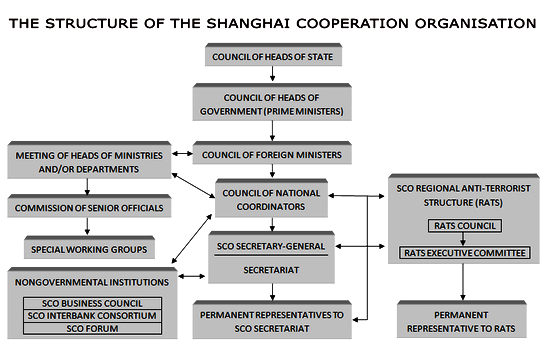Shanghai Cooperation Organization | 19 Jul 2022
For Prelims: Members of Shanghai Cooperation Organisation (SCO), Its official language, Objectives and Initiatives
For Mains: Issues and Challenges of SCO
Why in News?
Ahead of the Shanghai Cooperation Organisation (SCO) Summit to be held in September 2022, Varanasi has been selected as the SCO region’s first “Tourism and Cultural Capital for 2022-23.
- The SCO summit will be held in Samarkand, Uzbekistan where Iran and Belarus are likely to be the two newest additions to the SCO. Earlier, the Cabinet was apprised of the Agreement signed among the Shanghai Cooperation Organisation, SCO, member states on cooperation in the field of youth work among the authorized bodies of the member states of SCO.
- India will host the SCO summit next year 2023.
What is the Initiative?
- Varanasi’ “Cultural and Tourism Capital” has been decided under a new rotating initiative to promote people-to-people contacts and tourism among the member states.
- Each year a city of the cultural heritage of a member country that will take over the rotating Presidency of the organisation will get the title to highlight its prominence.
- The new initiative will come into force after the Samarkand summit following which India will take over the Presidency and host the next Heads of the State summit.
Why does the SCO Seek Expansion?
- It is seen that the SCO’s international influence is rising and the principles of the SCO charter are being widely accepted.
- With expansion, China and Russia are looking to frame the grouping as a counter to the West, especially the expansion of NATO (North Atlantic Treaty Organisation).
- However, it is believed that SCO and NATO have stark contrasts between them.
- The expansion of NATO is totally different as the SCO is a cooperative organisation based on non-alignment and not targeting a third party.
- NATO is based on Cold War thinking. The logic of NATO is creating new enemies to sustain its own existence.
What is the Shanghai Cooperation Organisation?
- About:
- SCO is a permanent intergovernmental international organization.
- It’s a Eurasian political, economic and military organization aiming to maintain peace, security and stability in the region.
- It was created in 2001.
- The SCO Charter was signed in 2002, and entered into force in 2003.
- Genesis:
- Prior to the creation of SCO in 2001, Kazakhstan, China, Kyrgyzstan, Russia and Tajikistan were members of the Shanghai Five.
- Shanghai Five (1996) emerged from a series of border demarcation and demilitarization talks which the four former Soviet republics held with China to ensure stability along the borders.
- Following the accession of Uzbekistan to the organization in 2001, the Shanghai Five was renamed the SCO.
- India and Pakistan became members in 2017.
- Objectives:
- Strengthening mutual trust and neighbourliness among the member states.
- Promoting effective cooperation in -politics, trade & economy, research & technology and culture.
- Enhancing ties in education, energy, transport, tourism, environmental protection, etc.
- Maintain and ensure peace, security and stability in the region.
- Establishment of a democratic, fair and rational new international political & economic order.
- Membership:
- Kazakhstan, China, Kyrgyzstan, Russia, Tajikistan, Uzbekistan, India and Pakistan.
- Structure:
- Heads of State Council: The supreme SCO body which decides its internal functioning and its interaction with other States & international organisations, and considers international issues.
- Heads of Government Council: Approves the budget, considers and decides upon issues related to economic spheres of interaction within SCO.
- Council of Ministers of Foreign Affairs: Considers issues related to day-to-day activities.
- Regional Anti-Terrorist Structure (RATS) – Established to combat terrorism, separatism and extremism.
- SCO Secretariat:
- Based in Beijing to provide informational, analytical & organizational support.
- Official language:
- The official working language of the SCO Secretariat is Russian and Chinese.
What is the Relevance of the Grouping for India?
- Through the years, the SCO hosts have encouraged members to use the platform to discuss differences with other members on the sidelines.
- It was on such an occasion that current Indian Prime Minister held a bilateral meeting with former Pakistani Prime Minister Nawaz Sharif in 2015 and Foreign Minister negotiated a five-point agreement with his Chinese counterpart on the side-lines of the Moscow conference in 2020.
- India is also a part of the ‘Quadrilateral’ grouping with the U.S., Japan and Australia.
- Its association with the grouping of a rather different nature is part of its foreign policy that emphasises on principles of “strategic autonomy and multi-alignment”.
UPSC Civil Services Examination Previous Year Question (PYQ)
Q. ‘Beijing Declaration and Platform for Action’, often seen in the news, is (2015)
(a) a strategy to tackle the regional terrorism, an outcome of a meeting of the Shanghai Cooperation Organization
(b) a plan of action for sustainable economic growth in the Asia-Pacific Region, an outcome of the deliberations of the Asia-Pacific Economic Forum
(c) an agenda for women’s empowerment, an outcome of a World Conference convened by the United Nations
(d) a strategy to combat wildlife trafficking, a declaration of the East Asia Summit
Ans: (c)
Exp:
- The Beijing Declaration and Platform for Action is a global commitment to achieve equality, development and peace for women worldwide. It was adopted in September, 1995 at the Fourth World Conference on Women held in Beijing. It builds upon consensus and progress made at earlier UN Conferences, particularly the Conference on Women in Nairobi in 1985.
- The Platform for Action is an agenda for women’s empowerment. It aims at accelerating the implementation of the Nairobi Forward-looking Strategies for the Advancement of Women and at removing all the obstacles to women’s active participation in all spheres of public and private life through a full and equal share in economic, social, cultural and political decision-making. Therefore, option (c) is the correct answer.

